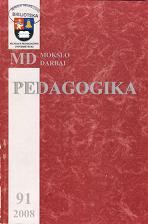Mokinių pažangos ir pasiekimų vertinimo kaita edukacinės paradigmos virsmo sąlygomis
Shift of Student's Assessment in Conditions of Change of Educational Paradigm
Author(s): Renaldas Čiužas, Jolanta NavickienėSubject(s): Education
Published by: Vytauto Didžiojo Universitetas
Keywords: teacher's didactic competence; paradigm; student's assessment.
Summary/Abstract: In transition of national curriculum and nature of learning process are changing requirement to teachers and its didactic competence. the assessment of student's achievements is very important by analysing teacher's didactic competence. Its concept is changing and assuming different point of change of educational paradigm. this article analyse teachers competence to asses students achievements. the concept of student's assessment is described in three educational paradigms: influence pedagogy, interaction pedagogy and learning pedagogy. there is assumption that teachers attitude depend on which educational paradigm he guides While carrying out the research 916 teachers and 931 students from different regions of Lithuania were questioned. referring to the obtained results, the following can be stated: 1.Often teachers use criterion-based and student's progress fixed assessment's strategies. teachers also know standard-based assessment but this concept they use very rarely. 2. In pedagogical process teachers use rarely in teraction with student by assessing achievements, but they have theoretical knowledge about learning pedagogy based student's assessment model and agree to importance to monitor and asses student's progress. 3. the change of educational paradigm in assessment process is started but incident not to all teachers. 4. the change to attitude to assessment process depends on school location (city, town, village), teacher's qualification, and subject. teachers from village schools or having teachers / senior teacher qualification category or science teachers are using significant frequently learning paradigm based student's assessment concept.
Journal: Pedagogika
- Issue Year: 2008
- Issue No: 91
- Page Range: 53-59
- Page Count: 7
- Language: Lithuanian

